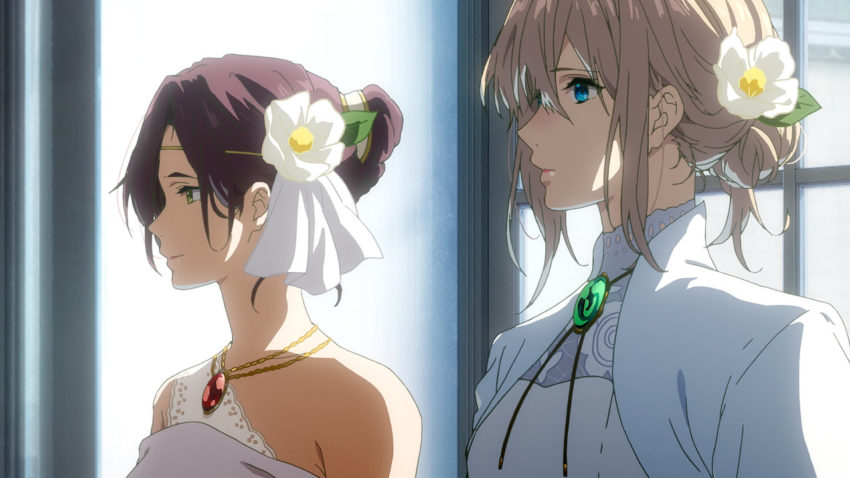By Jeannette Ng.

An “Auto Memory Doll” was originally the name given to the typewriters of Telsis, invented by a man who wanted to help his novelist wife to continue writing after she became blind. But much as “computers” were once both the machines that computed and the women who operated them, Auto Memory Doll became the name for the women who typed out letters and took notes upon the machines.
In the Violet Evergarden video spin-off Eternity and the Auto Memory Doll, however, it is not Violet’s skills as a typist or letter writer that takes centre stage. At the request of the Drossel Royal Family, Violet becomes a companion to Isabella York, a genteel young woman struggling with her studies at a girls’ boarding school.
Violet makes herself useful, stepping in as something of a knight protector to Isabella, warding off catty confrontations with other girls. It is clear from the start that Isabella has secrets of her own, as she proves herself resistant to being remade by the school. She is initially antagonistic towards Violet, but slowly and very awkwardly, an intimacy blooms between them. They braid each other’s hair, comfort each other’s nightmares and even bathe together. There are shades of the romantic in their interactions, especially when they dance in white at Isabella’s debut, though it is only in the companion novella from Isabella’s perspective that she articulates their intimacy as “falling in love.”
There’s also an intriguing dash of worldbuilding within the school, where Isabella’s rival is named Ashley Lancaster. As anyone with a passing familiarity to the War of the Roses can tell you, the Houses of York and Lancaster were very much at odds.

Violet and Isabella’s romantic friendship at school, with all its stumbling affection all bound up in promises and duty, is but half the film. The second half is built around Benedict Blue’s declaration that every letter must be delivered. We skip ahead three years and Violet is surprised by the visit of her now-estranged friend’s little sister. Taylor in all her precocious, fluffy-haired glory has come to Leiden to become a postman. Under protest, Benedict takes her under his wing and teaches her the trade. The importance is reiterated of letters as a tangible manifestation of emotions, a vital intermediary between people unable to utter their true feelings out loud.

Palpable throughout the film is the sense that the characters’ world is changing. At the close of the TV series, the peace treaty had just been signed and the world was still healing from the war. In this story, we see a world restless with change. The streets are busier and more full of cars than ever before. Benedict wheedles with Claudia to upgrade his battered bicycle for a shiny new motorcycle. A radio tower is being built, as an old woman worries that the waves emitted from it will be her demise. And, of course, Taylor the little foundling grows up.
Eternity and the Auto Memory Doll continues the series’ interest in women’s perspectives, returning to them chafing at their roles in this changing world. Isabella’s story reprises elements of the requirements of femininity, and the pressures of arranged marriage and sacrifice for a young girl (a daughter or a younger sister), but a few shades darker, the ending being more bitter than sweet. The recurring importance of names, a frequent topic in the TV series, is elaborated as Isabella reveals her original name and identity — that which she has given up to keep her sister safe.
An accompanying novella from Isabella’s perspective (included in the UK release) accentuates this as it centres her suffering instead of shifting perspective to Taylor, her source of hope. The novella bluntly fleshes out details of her unhappy marriage and why she stopped writing to Violet, but aside from that plot, it also offers a counterpoint to the themes of language and identity, how the articulation of the self through a diary can become an act of defiance. In the face of those who would erode one’s sense of self, narration becomes its last bastion. The novella toys with language, and it is heartbreaking to see it slip away as Isabella sinks further into her despair.
Though offering few conclusions, Eternity and the Auto Memory Doll is a beautiful chapter in Violet’s story, an opportunity to linger a just moment longer with these characters in their changing world.
Jeannette Ng is the author of Under the Pendulum Sun. Violet Evergarden: Eternity and the Auto Memory Doll, is released in the UK by Anime Limited.


